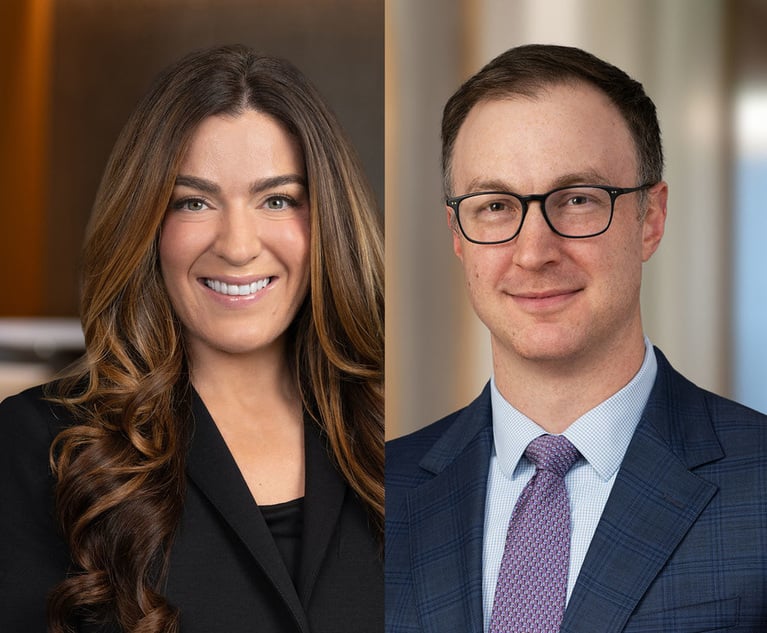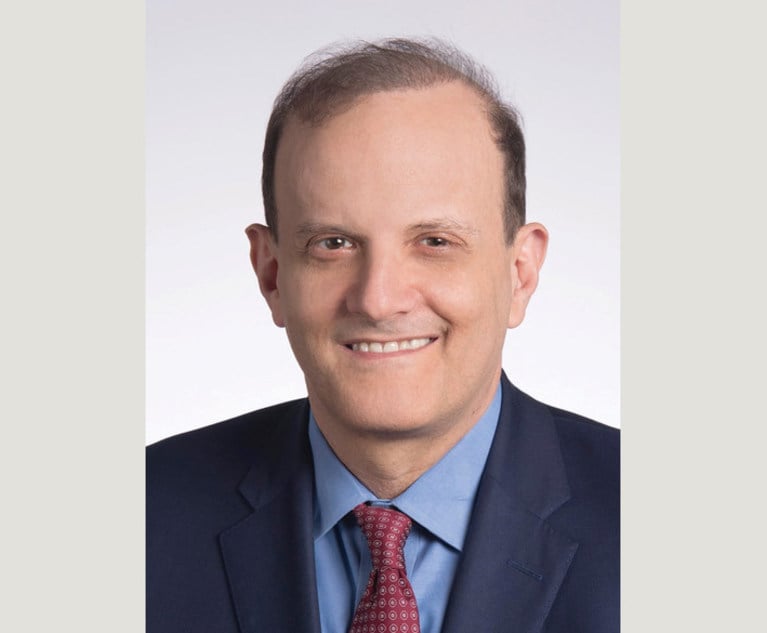 Leslie E. John of Ballard Spahr
Leslie E. John of Ballard SpahrInterrupters Needed to Bolster Diversity at Large Law Firms
Last month the ABA released another study—"Walking Out the Door: The Facts, Figures, and Future of Experienced Women Lawyers in Private Practice"—that tried to answer the question why experienced women are leaving the practice of law.
December 06, 2019 at 12:43 PM
6 minute read
Last month the ABA released another study—"Walking Out the Door: The Facts, Figures, and Future of Experienced Women Lawyers in Private Practice"—that tried to answer the question why experienced women are leaving the practice of law. I, most other women lawyers, and especially diverse women lawyers, have no trouble answering that question.
The study surveyed experienced women lawyers in large law firms, their male counterparts and managing partners. The study noted that the number of women of color in its sample was low, not surprising given the low number of women of color in large law firms generally. The study cited the usual statistics—despite entering the profession in large numbers for the past 40 years, women remain underrepresented in equity partnership ranks and leadership positions, and progress is slow. Progress is further complicated by the ever-shrinking numbers of equity partners in large law firms. Since 2015 the number of partner promotions among AmLaw 200 firms has dropped by 29%. Of course, for those of us with lived experiences, as women lawyers, as lawyers of color, as LGBTQ lawyers or lawyers with disabilities, these numbers are hardly surprising.
The authors do not mince words with their conclusion: "The greatest challenge facing large firms today is whether they will move beyond mere lip service to the goal of greater diversity by taking concrete and specific steps to meet the needs of women lawyers and lawyers of color." The study outlines nine steps that firms can take, including developing a strategy and timeline, taking a hard look at data (focusing on key metrics such as attrition, promotion, work assignments, compensation, bonuses, credit allocation and client succession), and assigning firm leaders an initiative or area for improvement and then holding firm leaders accountable.
One step set forth in the study that those in the field of diversity and inclusion have long championed is that firms should ensure there is a critical mass of women and diverse lawyers on key firm committees. The study encourages firms to adopt the Mansfield Rule, which sets an aspirational goal of having at least 30% women lawyers, lawyers of color, LGBTQ lawyers and lawyers with disabilities in firm leadership.
While we should encourage firm leaders to adopt and implement these nine steps, what struck the closest to home were survey results showing the different experiences of men and women lawyers. These results were strikingly similar to those reported in 2018 in a joint study "You Can't Change What You Can't See: Interrupting Racial and Gender Bias in the Legal Profession," prepared for the ABA's Commission on Women in the Profession, the Minority Corporate Counsel Association and the Center for WorkLife Law, which documented the different experiences of women lawyers and lawyers of color to those of their white male counterparts.
Over 80% of women reported being mistaken for "the help;" we know this happens to lawyers of color, too, and women lawyers of color experience this at even greater frequency. Fifty percent of women—one out of two women lawyers—reported being subject to sexual harassment; we know lawyers of color face harassment, too. Both report being subjected to demeaning comments, stories or jokes.
Women report not being given credit for their work; we know this happens to lawyers of color too. The "prove-it-again" bias—having to go "above and beyond" to get the same recognition and respect from colleagues—and tightrope bias—having to do more noncareer enhancing "office housework"—documented in the 2018 study continue to plague the profession. In an article in the Harvard Business Review titled "Why Women and People of Color in Law Still Hear 'You Don't Look Like a Lawyer,'" Tsedale Melaku calls it the "invisible labor clause." That is, women and people of color are "required to perform added, unacknowledged, and uncompensated labor and to pay additional 'taxes' for their inclusion in these social and professional spaces," writes Melaku. It all amounts to the "success fatigue." This fatigue is real, and is what is driving women lawyers and lawyers of color from the profession.
What we need in this profession are interrupters. We need to interrupt the old (current) ways of thinking. We need to challenge implicit biases. Last year the Philadelphia Diversity Law Group held a symposium, "Diversity in the First Chair: Symposium on Women and Diverse Lawyers in the Courtroom and the Boardroom." We started the day with a session for law firm managing partners and firm leaders led by Kenji Yoshino, Chief Justice Earl Warren professor of Constitutional Law at the New York University School of Law. Yoshino described "covering" behavior, in which individuals downplay or reject manners, affiliations or activities in order to "fit in" at work, to the detriment of both the individual and the organization. He challenged the ways we think, offering strategies that firms can use to create environments where all lawyers have a shared sense of belonging. The symposium also had a panel of white male attorney sponsors and women and diverse sponsees to discuss how the sponsees were given trial and other experiences and how they were positioned to become first chair and lead counsel.
The symposium had a powerful effect on those who attended. But we cannot rest on a one-day event. We need to encourage our firms to implement the learnings, whether it be from the symposium or recent studies. The 2018 study has a series of readily implementable recommended bias interrupters that it encourages firms to adopt in hiring, assignments, performance evaluations and partner compensation. We need our firms to ramp up implicit bias training. And, we obviously need a dose of sexual harassment training while we are at it.
We need to build positive relationships. Melaku speaks of the need for lawyers of color, especially women lawyers of color, to build sponsor relationships with key white male partners. Sponsor relationships make a difference as the PDLG panel brought home. I've seen the difference that having a sponsor can have. And, for most of us, that sponsor was a white man. Women and diverse lawyers need access to sponsors. Following the lead of corporate America, there are law firms that are implementing sponsorship programs aimed at filling this void.
As a woman who has practiced in this profession for over 30 years and as the granddaughter of an immigrant from China, it is easy to feel the fatigue. But I prefer to think instead of what we all can do, especially for those entering the profession. Let's encourage our firms to take a hard look at policies and practices that we can change.
Leslie E. John is a partner at Ballard Spahr where she heads the antitrust practice group. She is co-president of the Philadelphia Law Group, president of the Philadelphia Bar Foundation, and general counsel to Women's Way. She is a member of the Forum of Executive Women.
This content has been archived. It is available through our partners, LexisNexis® and Bloomberg Law.
To view this content, please continue to their sites.
Not a Lexis Subscriber?
Subscribe Now
Not a Bloomberg Law Subscriber?
Subscribe Now
NOT FOR REPRINT
© 2025 ALM Global, LLC, All Rights Reserved. Request academic re-use from www.copyright.com. All other uses, submit a request to [email protected]. For more information visit Asset & Logo Licensing.
You Might Like
View All
Chair of Montgomery McCracken Decamps for Morgan Lewis

Avoiding Conflict When Relating Advice to an Adverse Party to Facilitate a Client Matter
4 minute read
Law Firms Mentioned
Trending Stories
- 1Letter From London: 5 Predictions for Big Law in 2025, Plus 5 More Risky Ones
- 2Crypto Groups Sue IRS Over Decentralized Finance Reporting Rule
- 3Jenner Brings Back Zachary Schauf from DOJ's Office of Legal Counsel
- 4'Erroneous Assumption'?: Apple Challenges DOJ Antitrust Remedy in Google Search Monopoly Case
- 5A Jury to Determine Whether Stairs Were Defectively Designed in Injury Case, State Appellate Court Rules
Who Got The Work
Michael G. Bongiorno, Andrew Scott Dulberg and Elizabeth E. Driscoll from Wilmer Cutler Pickering Hale and Dorr have stepped in to represent Symbotic Inc., an A.I.-enabled technology platform that focuses on increasing supply chain efficiency, and other defendants in a pending shareholder derivative lawsuit. The case, filed Oct. 2 in Massachusetts District Court by the Brown Law Firm on behalf of Stephen Austen, accuses certain officers and directors of misleading investors in regard to Symbotic's potential for margin growth by failing to disclose that the company was not equipped to timely deploy its systems or manage expenses through project delays. The case, assigned to U.S. District Judge Nathaniel M. Gorton, is 1:24-cv-12522, Austen v. Cohen et al.
Who Got The Work
Edmund Polubinski and Marie Killmond of Davis Polk & Wardwell have entered appearances for data platform software development company MongoDB and other defendants in a pending shareholder derivative lawsuit. The action, filed Oct. 7 in New York Southern District Court by the Brown Law Firm, accuses the company's directors and/or officers of falsely expressing confidence in the company’s restructuring of its sales incentive plan and downplaying the severity of decreases in its upfront commitments. The case is 1:24-cv-07594, Roy v. Ittycheria et al.
Who Got The Work
Amy O. Bruchs and Kurt F. Ellison of Michael Best & Friedrich have entered appearances for Epic Systems Corp. in a pending employment discrimination lawsuit. The suit was filed Sept. 7 in Wisconsin Western District Court by Levine Eisberner LLC and Siri & Glimstad on behalf of a project manager who claims that he was wrongfully terminated after applying for a religious exemption to the defendant's COVID-19 vaccine mandate. The case, assigned to U.S. Magistrate Judge Anita Marie Boor, is 3:24-cv-00630, Secker, Nathan v. Epic Systems Corporation.
Who Got The Work
David X. Sullivan, Thomas J. Finn and Gregory A. Hall from McCarter & English have entered appearances for Sunrun Installation Services in a pending civil rights lawsuit. The complaint was filed Sept. 4 in Connecticut District Court by attorney Robert M. Berke on behalf of former employee George Edward Steins, who was arrested and charged with employing an unregistered home improvement salesperson. The complaint alleges that had Sunrun informed the Connecticut Department of Consumer Protection that the plaintiff's employment had ended in 2017 and that he no longer held Sunrun's home improvement contractor license, he would not have been hit with charges, which were dismissed in May 2024. The case, assigned to U.S. District Judge Jeffrey A. Meyer, is 3:24-cv-01423, Steins v. Sunrun, Inc. et al.
Who Got The Work
Greenberg Traurig shareholder Joshua L. Raskin has entered an appearance for boohoo.com UK Ltd. in a pending patent infringement lawsuit. The suit, filed Sept. 3 in Texas Eastern District Court by Rozier Hardt McDonough on behalf of Alto Dynamics, asserts five patents related to an online shopping platform. The case, assigned to U.S. District Judge Rodney Gilstrap, is 2:24-cv-00719, Alto Dynamics, LLC v. boohoo.com UK Limited.
Featured Firms
Law Offices of Gary Martin Hays & Associates, P.C.
(470) 294-1674
Law Offices of Mark E. Salomone
(857) 444-6468
Smith & Hassler
(713) 739-1250






